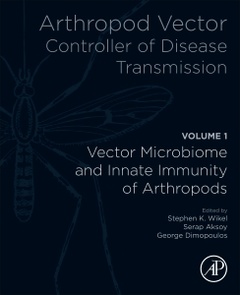Arthropod Vector: Controller of Disease Transmission, Volume 1 Vector Microbiome and Innate Immunity of Arthropods
Coordonnateurs : Wikel Stephen K., Aksoy Serap, Dimopoulos George

Arthropod Vector: Controller of Disease Transmission, Volume 1: Vector Microbiome and Innate Immunity of Arthropods is built on topics initially raised at a related Keystone Symposium on Arthropod Vectors. Together with the separate, related Volume 2: Vector Saliva-Host Pathogen Interactions, this work presents a logical sequence of topic development that leads to regulatory considerations for advancing these and related concepts for developing novel control measures.
The three themes of symbionts, vector immune defenses and arthropod saliva modulation of the host environment are central to the concept of determinants of vector competence that involves all aspects of vector-borne pathogen development within the arthropod that culminates in the successful transmission to the vertebrate host.
These three areas are characterized at the present time by rapid achievement of significant, incremental insights, which advances our understanding for a wide variety of arthropod vector species, and this work is the first to extensively integrate these themes.
2. Conservation and Convergence of Immune Signaling Pathways With Mitochondrial Regulation in Vector Arthropod Physiology
3. Wolbachia-Mediated Immunity Induction in Mosquito Vectors
4. Modulation of Mosquito Immune Defenses as a Control Strategy
5. Molecular Mechanisms Mediating Immune Priming in Anopheles gambiae Mosquitoes
6. The Mosquito Immune System and Its Interactions With the Microbiota: Implications for Disease Transmission
7. Using an Endosymbiont to Control Mosquito-Transmitted Disease
8. Effect of Host Blood–Derived Antibodies Targeting Critical Mosquito Neuronal Receptors and Other Proteins: Disruption of Vector Physiology and Potential for Disease Control
9. Role of the Microbiota During Development of the Arthropod Vector Immune System
10. Host–Microbe Interactions: A Case for Wolbachia Dialogue
11. The Gut Microbiota of Mosquitoes: Diversity and Function
12. Targeting Dengue Virus Replication in Mosquitoes
13. Paratransgenesis Applications: Fighting Malaria With Engineered Mosquito Symbiotic Bacteria
14. Insulin-Like Peptides Regulate Plasmodium falciparum Infection in Anopheles stephensi
Dr. Aksoy is in her fourth decade of a highly recognized career in academic research and teaching, and a recipient of many awards and honors such as Nominated Fellow, Entomological Society of America, and winner of the Connecticut Technology Council Research, Innovation and Leadership award, both in 2015. She has taught in the areas of Molecular Entomology, Vector Biology, and Biology of Eukaryotic Parasites and Helminths, with a special research focus on biology of the tsetse fly and transmission and control of trypanosomiasis. Together with Dr. Wikel she was one of three scientific organizers of the Keystone Symposium on “The Arthropod Vector: The Controller of Transmission. She is also an Editorial Board Member for the Elsevier journal Insect Biochemistry and Molecular Biology.
In addition to his academic appointments, Dr. Dimopoulos is Director of the Johns Hopkins Malaria Research Institute Parasitology Core Facility. He is a permanent memb
- Includes such major areas of coverage as host-derived factors, innate immunity of arthropod presentations and the arthropod microbiome/symbionts
- Features expertly curated topics, ensuring appropriate scope of coverage and aid integration of concepts and content
- Provides the necessary scientific background for the development of the research and discussions that have laid the groundwork for future efforts, including the Keystone Symposium and relevant meetings at NIAID/NIH
Date de parution : 04-2017
Ouvrage de 270 p.
19x23.3 cm
Thèmes d’Arthropod Vector: Controller of Disease Transmission... :
Mots-clés :
<; P>; mosquito; Anopheles; Drosophila; tick; tsetse fly; sand fly; Wolbachia; insect vectors; microbiota; vector-borne pathogens; insect immunity; microbiome; disease transmission; host defense pathways; paratransgenesis; molecular mechanisms; blood feeding; functional genomics; Plasmodium<; /P>



